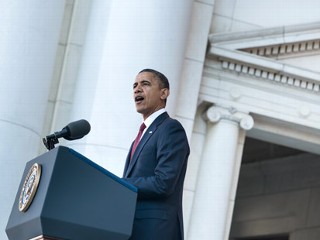 Shortly after the†United Nations General Assembly†voted in late November to upgrade the status of the Palestinians, the government of Israeli Prime Minister†Benjamin Netanyahu†announced that it would advance plans to establish a settlement in an area of the West Bank known as E-1, and that it would build 3,000 additional housing units in east Jerusalem and the West Bank.
Shortly after the†United Nations General Assembly†voted in late November to upgrade the status of the Palestinians, the government of Israeli Prime Minister†Benjamin Netanyahu†announced that it would advance plans to establish a settlement in an area of the West Bank known as E-1, and that it would build 3,000 additional housing units in east Jerusalem and the West Bank.A large settlement in E-1, an empty zone between Jerusalem and the Jewish settlement city of Maaleh Adumim, would make the goal of politically moderate Palestinians -- the creation of a geographically contiguous state -- much harder to achieve.
The world reacted to the E-1 announcement in the usual manner: It condemned the plans as a provocation and an injustice. President†Barack Obamaís administration, too, criticized it. ďWe believe these actions are counterproductive and make it harder to resume direct negotiations or achieve a two-state solution,Ē said Tommy Vietor, a spokesman for the National Security Council.
ĎBest Interestsí
But what didnít happen in the White House after the announcement is actually more interesting than what did.
When informed about the Israeli decision, Obama, who has a famously contentious relationship with the prime minister, didnít even bother getting angry. He told several people that this sort of behavior on Netanyahuís part is what he has come to expect, and he suggested that he has become inured to what he sees as self-defeating policies of his Israeli counterpart.
In the weeks after the UN vote, Obama said privately and repeatedly, ďIsrael†doesnít know what its own best interests are.Ē With each new settlement announcement, in Obamaís view, Netanyahu is moving his country down a path toward near-total isolation.
And if Israel, a small state in an inhospitable region, becomes more of a pariah -- one that alienates even the affections of the U.S., its last steadfast friend -- it wonít survive.†Iran†poses a short-term threat to Israelís survival; Israelís own behavior poses a long-term one.
The dysfunctional relationship between Netanyahu and Obama is poised to enter a new phase. Next week, Israeli voters will probably return Netanyahu to power, this time at the head of a coalition even more intractably right-wing than the one he currently leads.
Obama has always had a complicated relationship with the prime minister. On matters of genuine security, Obama has been a reliable ally, encouraging close military cooperation, helping maintain Israelís qualitative military edge over its regional rivals and, most important, promising that he wonít allow Iran to cross the nuclear-weapons threshold.
Yet even this support didnít keep Netanyahu from pulling for Republican candidate†Mitt Romney†in last yearís presidential campaign.
On matters related to the Palestinians, the president seems to view the prime minister as a political coward, an essentially unchallenged leader who nevertheless is unwilling to lead or spend political capital to advance the cause of compromise.
Senator†John Kerry†of†Massachusetts, Obamaís nominee to replace†Hillary Clinton†as secretary of state, is said to be eager to re-energize the Middle East†peace process, but Obama -- who already has a Nobel Peace Prize -- is thought to be considerably more wary. He views the government of Palestinian Authority President†Mahmoud Abbas†as weak, but he has become convinced that Netanyahu is so captive to the settler lobby, and so uninterested in making anything more than the slightest conciliatory gesture toward Palestinian moderates, that an investment of presidential interest in the peace process wouldnít be a wise use of his time.
Obama, since his time in the Senate, has been consistent in his analysis of Israelís underlying challenge: If it doesnít disentangle itself from the lives of †West Bank†Palestinians, the world will one day decide it is behaving as an apartheid state.
The Consequences
For Israel, the short-term consequences of Obamaís frustration are limited. The U.S. wonít cut off its aid to Israel, and Obamaís effort to thwart Iranís nuclear ambitions will continue whether or not heís fed up with Netanyahu.
But it is in terms of American diplomatic protection -- among the Europeans and especially at the UN -- that Israel may one day soon notice a significant shift. During Novemberís vote on†Palestineís status, the U.S. supported Israel and asked its allies to do the same. In the end, they were joined by a total of†seven other countries, including the Pacific powerhouses Palau and Micronesia.
When such an issue arises again, Israel may find itself even lonelier. It wouldnít surprise me if the U.S. failed to whip votes the next time, or if the U.S. actually abstained. I wouldnít be particularly surprised, either, if Obama eventually offered a public vision of what a state of Palestine should look like, and affirmed that it should have its capital in East†Jerusalem.
Obama isnít making unreasonable demands. Israeli concerns about the turmoil in†Syria†and the rise of the Muslim Brotherhood are legitimate in the American view, and Obama knows that broad territorial compromise by Israel in such an unstable environment is unlikely.
But what Obama wants is recognition by Netanyahu that Israelís settlement policies are foreclosing on the possibility of a two-state solution, and he wants Netanyahu to acknowledge that a two-state solution represents the best chance of preserving the country as a Jewish-majority democracy. Obama wants, in other words, for Netanyahu to act in Israelís best interests.
So far, though, there has been no sign that the Israeli government is gaining a better understanding of the world in which it lives.
By Bloomberg
The Iran Project is not responsible for the content of quoted articles.










